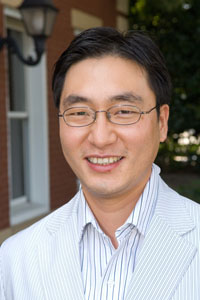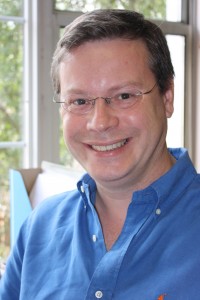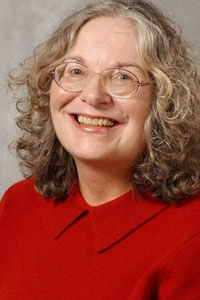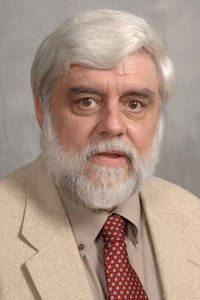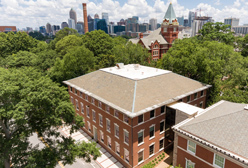Funded Research
Georgia Tech Community PIII: Presence, Impact, and Investment in Atlanta's Historic Westside, a project by Sheri Davis-Faulkner, director for community engagement of the IAC Westside Communities Alliance initiative, and Anna Kim, assistant professor in the College of Architecture, have been awarded a $38,000 GT FIRE grant.
Ayanda Francis, alumna of the School of Economics and The Sam Nunn School of International Affairs, has been selected for a Fulbright U.S. English Teaching Assistantship to Turkey.
Janelle Knox-Hayes, assistant professor in the School of Public Policy, has received a Fulbright U.S. Scholar grant to conduct research on Iceland's environmental finance and policy while in residence at the University of Iceland where she will be teaching and working on a book project.
Jordan Sturgis, master's student in The Sam Nunn School of International Affairs, has been awarded a Boren Fellowship and a State Department Title VIII Fellowship.
Recent Books by Faculty
Innovation and Inequality: Emerging Technologies in an Unequal World (Edward Elgar Publishing, 2014) edited by Susan Cozzens, professor in the School of Public Policy, examines the relationships between emerging technologies and social, economic, and other forms of inequality from an interdisciplinary approach.
On Occasion: Four Poets, One Year (Poetry Atlanta Press, 2014) by Karen Head, Blake Leland, JC Reilly, and Robert E. Wood is an extraordinary collection of poems by four faculty and staff members within the School of Literature, Media, and Communication that features poems written monthly by each based on a holiday or seasonal event.
Prisoners, Lovers, and Spies: the Story of Invisible Ink (Yale University Press, 2014) by Kristie Macrakis, professor in the School of History, Technology, and Society, uses stories about prisoners, scientists, lovers, and spies to trace the evolution of invisible secret writing and its impact on history.
Islam in the Balance: Ideational Threats in Arab Politics (Stanford University Press, 2014) by Lawrence Rubin, assistant professor in The Sam Nunn School of International Affairs, examines the threat perception and policies of two Arab, Muslim majority states, Egypt and Saudi Arabia, in response to the rise and activities of two revolutionary "Islamic states," established in Iran (1979) and Sudan (1989).
Growing Democracy in Japan: The Parliamentary Cabinet System since 1868 (The University Press of Kentucky, 2014) by Brian Woodall, associate professor in The Sam Nunn School of International Affairs, examines Japan's cabinet system in comparison to other capitalist parliamentary democracies, offering lessons for reformers and those working to establsh democratic institutions in Iraq, Afghanistan, China, and new regimes born during the Arab Spring.
What Does Georgia Tech Think?
Selected Press for Ivan Allen College of Liberal Arts
|
Boston on Economic Recovery
"After meandering through five years of uncharacteristic performance, the last several months signal economic growth has finally hit a normal stride," writes Thomas D. "Danny" Boston, professor of economics in The Sam Nunn School of International Affairs, in commentary for the Georgia Tech Amplifier. For three consecutive months the economy produced an average of 272,000 jobs. This amount is more than adequate to absorb displaced workers who are re-entering the market and normal labor force growth. The expansion is now marching to a normal beat." Source: GT Amplifier July 3, 2014
Allen Prize Recipient "Scores a First"
"There are some who, through great personal sacrifice and courage, impact the lives of countless individuals as well as those for generations to come. Beatrice Mtetwa is one such person," said Georgia Tech President G.P. "Bud" Peterson, in an article announcing the recipient of the 2014 Ivan Allen Jr. Prize for Social Courage. The article, published in a Zimbabwean newspaper, originated from the IAC communications team. Source: NewsDay Zimbabwe, June 28, 2014
Kongo across the Waters: A Student View
"I was surprised to learn that the artists do not come exclusively from western African backgrounds, so the fact that all were inspired by Kongo art shows the pervasiveness of Kongo culture in the modern West," said Anna Democko, a student at Georgia College and State University. "I would definitely recommend that anyone go see this exhibit, not only to learn about the fascinating history of the Kongo, but about how it has shaped American history and culture in innumerable ways." Source: Global Atlanta, June 27, 2014
Head on Different Paths
"If we are to sincerely promote new paths toward lifelong success, we must also acknowledge the consideration individuals will have to make when choosing what may or may not be the correct path for them," said Karen Head, assistant professor in the School of Literature, Media, and Communication. "A path that could very much be about the name recognition of the college they list on their résumé or the decision not to pursue a degree at all." Source: Inside Higher Ed, June 25, 2014
Lodato on Commuting by Skates
"You don’t usually get that [sort of attention] when you run. People have very strong reactions to it. Either you love it or hate it. I just happen to love it," said Thomas Lodato, a 29-year-old researcher and Ph.D. candidate at Georgia Tech [Graduate Program in Digital Media], on attention he receives when commuting by in-line skates. "It’s a fun mode of transportation, and I like it in all capacities, for the sheer enjoyment, for exercise, for exploring the way a city is built." Source: AJC, June 20, 2014
Borowitz on Satellite Vulnerabilities
"While a degradation of the capabilities provided by the nation’s space assets would hurt the military, it would also be detrimental for the general public," said Mariel Borowitz, assistant professor in The Sam Nunn School of International Affairs at the Georgia Institute of Technology, on the necessity of preventing or mitigating attacks on satellites. "The threat to satellite technology is serious. The United States has more satellites than any other country in the world, and satellite technologies are critical to both our economic system and our military." Source: National Defense Magazine, June 18, 2014
Rosenberger on Cell Phone Bans
"The evidence showing that handheld and hands-free cellphones are associated with the same dangerous drop in driving performance...is especially disconcerting in light of the fact that a majority of drivers still incorrectly believe that hands-free phones are a safe alternative," wrote Robert Rosenberger, assistant professor of philosophy [School of Public Policy] at Georgia Institute of Technology, in an article on the banning of cell phone use while driving. Source: Slate, June 16, 2014
Kosal on the War We Won't Expect
"In this global information age, being the most technologically advanced military power no longer guarantees national security. New developments are more accessible and affordable than ever to a large number of nations, and within the grasp of terrorists and other non-state actors," writes Margaret E. Kosal, assistant professor in The Sam Nunn School of International Affairs, in a feature in the Georgia Tech Alumni Magazine. Source: GT Alumni Magazine, June 13, 2014
Ries on GA Tax Amendment and Jobs
"Companies do this all the time, (judging) whether a particular political climate is inherent in a state or is going to change over time. Right now, Georgia is seen as a fiscally conservative state, and I don’t think most analysts are looking at it and saying Georgia might turn around and change tomorrow," said Christine Ries, professor of economics at Georgia Tech, on the amendment to cap the individual income-tax rate at its current six percent. "But anything that makes the public policy more reliable is going to lower the risk assessment and increase investment in the state or country." Source: AJC, June 11, 2014
DiSalvo on Boston's New Urban Mechanics
"You tend to get fairly surface-level responses to contemporary social conditions," said Carl DiSalvo, a professor of digital media at Georgia Tech on the culture of civic hacking. In the Boston Mayor's Office of New Urban Mechanics, however, he sees "one model of a kind of engagement that’s sustained and could potentially work." Source: Politico Magazine, June 10, 2014
Rosenberger on Anti-Homeless Design
"On the issue of the design and policy of public spaces, it is important to keep a view of what values guide our decision making, and what alternative values may also warrant consideration," wrote Robert Rosenberger, assistant professor of philosophy in the School of Public Policy at the Georgia Institute of Technology, in an article on the use of design to drive homeless people away. Source: The Atlantic, June 19, 2014
Borowitz on Critical Report on NASA
"While the NRC’s report is not a silver bullet for NASA’s human spaceflight program," said Mariel Borowitz, assistant professor in The Sam Nunn School of Internatioal Affairs at the Georgia Institute of Technology, "the evolving rhetorical consensus in Washington about Mars as a long-term goal makes it easier to have conversations about intermediate destinations, particularly the next step after the international space station." Source: SpaceNews, June 6, 2014
Brown on TVA Divestment
"The Tennessee Valley Authority can be a model for other utilities to follow when looking at how to reduce carbon emissions by 2030," said Marilyn Brown, professor in the School of Public Policy, on TVA's carbon-cutting success in light of its potential divestment. "The federal government has in place at least one example of how at least one place where it can be done without harming the economy." Source: Energywire, June 5, 2014 **Subscription required**
Royster on Westside Revitalization
At last week’s Northwest Community Alliance meeting, Jacqueline Royster, dean of Georgia Tech’s Ivan Allen College of Liberal Arts, presented a flier: “Together we can do better.” It showed a map of the triangle formed by three academic institutional centers—Georgia Tech, Georgia State University and the Atlanta University Center—and how they could be the anchors for the revitalization of Atlanta’s core (the new Falcons stadium happens to be strategically located in the bulls-eye). Source: Saporta Report, May 26, 2014
Royster on Kongo across the Waters
"When I walk in here, it’s like I become part of the ocean and go right from one continent to another, from one people in one point in time to another," said Jacqueline Royster, dean of the Ivan Allen College of Liberal Arts, on the signature exhibition of Africa Atlanta 2014. "[It's a] celebration of the connection...as this art interweaves our lives together." Source: WSB-TV, May 22, 2014
Jordan on Obama's Drone Strategy
Believing that targeted killing can actually weaken al-Qaeda means assuming al-Qaeda depends on a group of charismatic leaders. According to Georgia Tech Professor Jenna Jordon [The Sam Nunn School of International Affairs], that mistaken assumption has led the Obama Administration to pursue a strategy centered on targeting al-Qaeda's leadership with drones when it'd really be better to cut down on targeted killings altogether. Source: VOX, May 21, 2014
LeDantec on Civic Apps
"When we configure digital civic participation as a way to improve the city as a service, we fail to recognize that citizens are not consumers of cities, but producers of cities," said Christopher LeDantec, assistant professor at the School of Literature, Media, and Communication at the Georgia Institute of Technology, on the tendency of civic apps to operate as simply an avenue through which to report problems. LeDantec's op-ed piece in The Atlantic proposed a retooling of civic apps to instead focus on facilitating civic engagement. Source: The Atlantic, May 20, 2014
Best on Digital Natives
"Innovative, young, digitally enabled people are drivers of economic development," said Michael Best, who studies information technology and international development at the Georgia Institute of Technology, on the importance of the internet's children. Best recently teamed up with the International Telecommunication Union to create the first country-by-country tally of the world's digital natives. Source: Wired, May 7, 2014
Kosal on DIY Manufacturing Security Risks
"When an adversary has a capability edge, they are more likely to use it," said Margaret Kosal, an assistant professor at Georgia Tech's Sam Nunn School of International Affairs, on the potential security risks posed by 3D printers and other emerging DIY manufacturing technologies. "The challenge is trying to predict which new technologies can be used against us. No one has a crystal ball with that fidelity." Source: AAAS, May 16, 2014
Press Coverage for Mackrakis' “Prisoners, Lovers, and Spies"
"At hand is an utterly fascinating account of how secret writing has evolved from wartime messages written on the shaved head of a slave so he could slip undetected through enemy lines, to spy communiques concealed in pornographic postings on the Internet." Source: Washington Times, May 13, 2014. More press for Mackrakis book: Boston Globe April 19, 2014. WNYC The Takeaway with John Hockenberry, Think with Krys Boyd, PRI, The World with Clark Boyd, The Independent, Kirkus Review, Literary Review June 2014.
Garver on the China-Iran Relationship
"Too close an association would endanger China’s economically vital relationship with the United States," said John Garver, professor of international affairs at the Georgia Institute of Technology, on China's military and economic ties to Iran. "There are different voices and views within China about how close the China-Iran relationship should be, and how much risk would be entailed by cooperating with Iran against the U.S. Source: McClatchy, May 6, 2014
Goodman on Government Salaries for Cybersecurity Workers
"The government hurts its chances by allowing contractors who do cybersecurity work for federal agencies to offer higher salaries than the government does for similar jobs," said Sy Goodman, co-director of the Georgia Tech Information Security Center, on the lack of a competitive starting salary for government-employed cybersecurity. The Center has had NSF scholarship support for 12 years and is actively recruiting students. Source: Businessweek, April 15, 2014
July 10, 2014 - July 11, 2014
July 20, 2014 - July 21, 2014
July 24, 2014 - July 25, 2014
12:00 pm
September 3, 2014
3:00 pm
October 21, 2014
11:00 am
October 24, 2014 - October 25, 2014
8:00 am
November 1, 2014
10:00 am
|
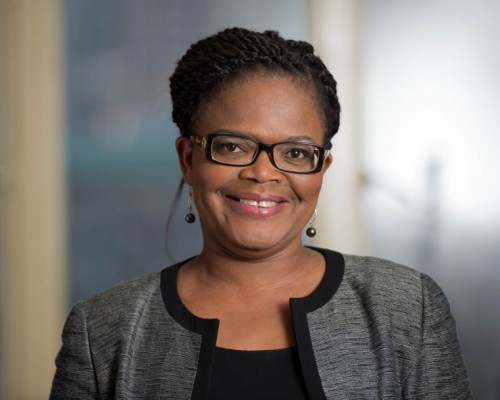
|
Mtetwa First Woman to Receive Ivan Allen Jr. Prize for Social Courage
Prominent human rights attorney Beatrice Mtetwa has been named recipient of the 2014 Ivan Allen Jr. Prize for Social Courage, an award given annually to individuals who, by asserting moral principle, positively affected public discourse at the risk of their careers, livelihoods, and sometimes lives.
“Ms. Mtetwa has endured a sometimes painful journey to achieve the larger purpose of freedom and justice for all,” said Georgia Tech President G.P. “Bud” Peterson. “That is the promise of a democracy, and Beatrice Mtwetwa embodies the effort to fulfill that promise. There are some who, through great personal sacrifice and courage, impact the lives of countless individuals as well as those for generations to come. Ms. Mtetwa is one such person.”
The eldest child of 50, Mtetwa grew up on a farm in Swaziland without electricity and running water. She became the first in her extended family to attend high school and went on to study law at the University of Botswana and Swaziland. After pursuing a career as a government prosecutor, she became disillusioned by the selective justice she saw being doled out and moved into private practice, where she was able to conduct human rights work without political interference. Her dedication to representing those persecuted under the Mugabe regime is represented in the documentary Beatrice Mtetwa and the Rule of Law.
Mtetwa has been internationally recognized for her defense of press freedom, facing physical assault and threats against her life in her quest to champion civil activists and local and international journalists.
“I am hoping that the message that will be sent out there is that one can be true to their beliefs regardless of whatever dangers might be lurking in the background,” said Mtetwa. “If more of us were prepared to do this kind of work, it would be more difficult to target them for persecution, and it is my hope that this award will help swell the numbers of people prepared to stand up for what is right.”
The Ivan Allen Jr. Prize for Social Courage will be presented to Beatrice Mtetwa during a ceremony at the Ivan Allen College on November 13, 2014. The presentation of this year’s award is especially significant as Mtetwa, an advocate for women’s equality and advancement, will be the first woman to receive the prize. It also comes at a time when government leaders in Zimbabwe are once again persecuting human rights defenders such as Mtetwa.
The Ivan Allen Jr. Prize for Social Courage is named after Allen, a former mayor of Atlanta and Georgia Tech graduate. In 1963, Mayor Allen testified before Congress in support of what would become the Civil Rights Act of 1964, risking his place in society and political future. Previous winners include Sam Nunn, William Foege, and Congressman John Lewis. The Prize comes with a stipend of $100,000, and is supported in perpetuity through a commitment by the Wilbur and Hilda Glenn Family Foundation.
|
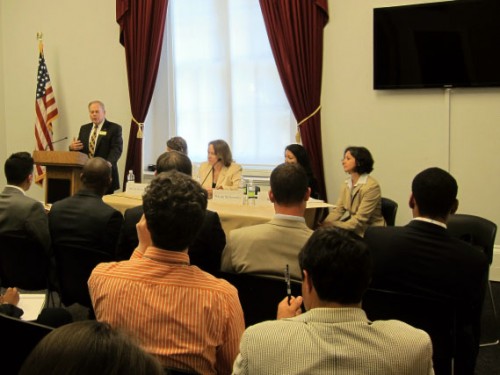
|
Isett Participates in Health IT Briefing for Washington Policymakers
In 2013, Georgia Tech had 930 research contracts with companies. Insights from these public-private partnerships—specifically innovation in healthcare IT—were the focus of a faculty briefing for federal policymakers in Washington on June 18. Public policy professor Kim Isett, was among the panel members who discussed the importance of working with legislators.
Faculty shared perspectives on what it takes to make such research alliances successful and urged congressional staffers to refresh their thinking about healthcare delivery.
A briefing from the Georgia Congressional Delegation about the state’s health information technology was conducted by Isett, associate professor in the School of Public Policy; Beth Mynatt, director of the Georgia Tech Institute for People and Technology; Sherry Farrugia, Georgia Tech strategic partners officer; and Margarita Gonzales, principal investigator for the Georgia Tech-Georgia Department of Community Health research program.
“Our state has been called ‘the nation’s health IT capital’ with over 200 companies that employ nearly 16,000 people,” said Georgia Tech Executive Vice President for Research Stephen Cross, who facilitated the discussion.
The panel described a pilot health information exchange for cancer patients in Rome, Georgia, which served as a successful model for partnership between state, federal, and university entities.
Isett discussed the necessity of providing legislators the information they need about technology, its costs, and distributional consequences to enable informed decisions, emphasizing that the information needs to be delivered in a usable and understandable way. Panelists underscored the importance of addressing challenges related to interoperability and access to data. Additionally, the panel encouraged staffers to consider Georgia Tech as a partner for decision support and to think about the format and type of data that would be helpful as they develop new policies.
The Washington, D.C. roundtables are part of an ongoing advocacy campaign supporting Georgia Tech’s strategic plan. “Our presence in D.C. has never been greater,” said Georgia Tech Director of Federal Relations Robert Knotts, “It is important to continue to show our leaders in the federal government that when they ask, ‘what does Georgia Tech think,’ they will receive information and testimony exactly appropriate to helping them address major issues facing our state and nation.”
|

|
FIFA: The Effect of Mega-Events on Economic Development
Just 45 days before the start of the World Cup, Mary McDonald, Homer Rice Chair in Sports and Society in the School of History, Technology, and Society, attended a conference in Brazil on international mega-events. In contrast to banners posted around Atlanta leading up to the Peachtree Road Race, McDonald saw minimal promotion of Brazil’s impending international sporting event.
“When I talked to conference organizers, they told me the Brazilian people love soccer but don’t really love FIFA,” McDonald said. “It’s kind of a common characteristic with mega events that people are usually displaced to build facilities, and some issues of democracy are suspended in order to get things done on time.” In Brazil, for example, a law was signed two years ago to allow the sale of alcohol at World Cup events, although it had been prohibited in soccer stadiums for nearly 10 years as a safety precaution.
McDonald is studying how some aspects of mega-events compare to sports at a more localized level. Specifically, she’s looking at the “halo effect” of sports in local communities, challenging the theory that sports can be used as a platform for solving grand social issues.
“The underlying assumption of the halo effect is that somehow the positive effects of sports will translate into a broader good,” she said. McDonald has studied groups trying to apply the halo effect, a North American concept, to “social ills” around the world. “Sports can be enjoyable and fun, but in terms of trying to solve social issues like poverty, you probably need a lot of other tools in your kit,” she said.
At the conference in Brazil, McDonald presented a paper on the idea of using sports for economic development.
“Part of the justification for hosting mega-events is that they can be drivers of economic development or decrease social disparities, but most of the data show that, if anything, in terms of what you get out of public investment, it’s a wash,” she said. “Increasingly in the post 9/11 world, we see rising facility and security costs, as well as vacant sporting facilities, after the mega events conclude, suggesting that large-scale international sporting events do not provide a very good return on public investment. People argue that resources could be used for more important things, such as public infrastructure, education, health, job creation.”
All is not lost for the 2014 World Cup, though. McDonald believes it has given Brazilians a sort of megaphone for some of its nation’s problems as well as issues with FIFA, letting these ideas be more widely known.
And, of course, many people get enjoyment out of sports—players, coaches, and fans alike. The World Cup may bring Americans together, creating what McDonald says is a temporary sense of sharing called “communitas.”
“There is a ritualistic element of sport, especially in a relationship to fandom where fans can express a variety of emotions and come together temporarily with others around the common goal of rooting for a given team during a game.”
---------------------------------------------------
World Cup 2014: Political Struggles Play Out on the Soccer Pitch
Controversy, protests and negative press aside, Kirk Bowman, professor in The Sam Nunn School of International Affairs, is fully indulging in the 2014 World Cup.
“This year’s quality of play and drama, glory, and agony are the best in memory,” he said.
Bowman teaches a “Soccer and Global Politics” course and is working on a book by the same name. He views understanding soccer as a crucial element to understanding a number of other global issues. He and a group of students are in Spain for a summer study abroad program and are observing this year’s event from the home of the reigning world champions. Read more.
|
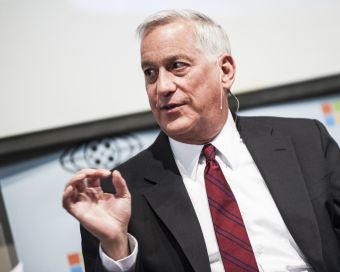
|
Isaacson Advocates for Humanities Education
For all of the advances in artificial intelligence, computers alone will never supersede what creative human minds and computers can accomplish jointly, according to Walter Isaacson, biographer and president of the Aspen Institute and lecturer at the 43rd annual Jefferson Lecture in the Humanities.
"This is what the arts and the humanities teach us and why these realms are as valuable to our education as science, technology, engineering, and math," said Isaacson. "If we humans are to uphold our end of the bargain when it comes to a man-machine symbiosis, if we are going to retain our role as partners with machines, we must continue to nurture the humanities, the wellsprings of our creativity.”
Isaacson was lecturer at the 43rd annual Jefferson Lecture in the Humanities, sponsored by the National Endowment for the Humanities. Established in 1972, it is the highest honor the federal government confers for distinguished intellectual achievement in the humanities. Arthur Miller, Toni Morrison, and John Updike are among the past honorees.
In his lecture, "The Intersection of the Humanities and the Sciences," the 61-year-old Isaacson said that a robust understanding of the humanities would be critical in the next phase of the digital revolution, which will fuse technology with media, fashion, music, entertainment, education, and the arts. The new era will go beyond the current pouring of "old wine"—books, newspapers, songs, movies—into new "digital bottles," he said, and give way to novel forms of expression.
"This innovation will come from people who are able to link beauty to engineering, humanity to technology, and poetry to processors," Isaacson said.
Those who will rise to the top in this new landscape will be individuals who flourish where the arts, humanities, sciences, and technology intersect and who have a "rebellious sense of wonder that opens them to the beauty of them all."
Isaacson drew on the lives of great thinkers of recent centuries, including Benjamin Franklin, Albert Einstein, and the writer and mathematician Ada Lovelace. Those figures distinguished themselves not solely by their brilliance—smart people are not so uncommon—but by their ability to think differently and to straddle the humanities and the sciences. Einstein, for example, marveled at "nature’s most mundane amazements. His success came from his imagination, rebellious spirit, and his willingness to question authority. These are things the humanities teach.
In 2011, Isaacson wrote himself into the consciousness of a new generation of nonfiction readers with his biography of Steve Jobs, the co-founder of Apple and a demigod in the worlds of consumer technology and product design. The infamously exacting Jobs hand-selected Isaacson for the task, granting the writer dozens of interviews as he battled cancer during the final years of his life. Isaacson has also written biographies of Franklin, Einstein, and Henry Kissinger.
"Jobs understood that the best technology incorporates the arts and humanities. He was a genius in understanding how people would relate emotionally to their devices," he said. "He understood the emotion, beauty, and simplicity that make for a great human-machine interface."
Walter Isaacson studied literature and history at Harvard University, later continuing his studies as a Rhodes Scholar at the University of Oxford. He is a journalist who served as editor of Time magazine, chairman and chief executive of CNN, and is presently the president and chief executive of the Aspen Institute.
This article originated in the Chronicle of Higher Education.
|
Kim Argues the Merit of Net Neutrality
As the internet and its use become more pervasive and ubiquitous, internet service providers (ISPs) are seeking to establish a tiered service model. This contradicts a founding principle of the World Wide Web, net neutrality, which states that ISPs and governments should treat all data on the internet equally, not discriminating or charging differentially by user, content, site, platform, application, equipment, or mode of communication.
Byun-Cheol Kim, associate professor in the School of Economics, argues that the merit of net neutrality depends crucially on content providers’ business models. In his paper Net Neutrality, Business Models, and Internet Interconnection, to be published in The American Economic Journal: Microeconomics, Kim analyzes the effect of net neutrality regulation in a two-sided market framework when content is heterogeneous in its sensitivity to delivery quality. More generally, the analysis offers a theory on second-degree prize discrimination in two-sided platform markets.
Kim’s paper comes at a crucial time in net neutrality legislation. In an apparent shift in policy, the Federal Communications Commission (FCC) announced in April that it would propose new rules that allow content providers differential access to high-speed internet connections.
Read Net Neutrality, Business Models, and Internet Interconnection, authored by Byun-Cheol Kim in collaboration with Doh-Shin Jeon and Jay Pil Choi.
Kim joined the School of Economics in 2008 and currently pursues research in the fields of industrial organization and applied microeconomics. He has taught classes in microeconomics, industrial organization, math for economics, and game theory.
|
Europe as a Global Regulator? Young Explores the Limits of EU Influence in International Food Safety Standards
The European Union is often depicted as a global regulatory power. In his article "Europe as a Global Regulator? The Limits of EU Influence in International Food Safety Standards," Alasdair Young contends that this depiction, while not unfounded, is misleading.
Young aims to clarify under what conditions the EU converts its regulatory capability into influence. Specifically it seeks to resolve the puzzle of the EU’s poor performance in the setting of global food safety standards within the Codex Alimentarius Commission. The argument is deceptively simple. The EU’s limited influence is due to it being a preference outlier. In a context where standards can be decided by voting, the stringency of the EU’s regulations, rather than being a source of influence, is a liability. This extreme case demonstrates that the EU’s ability to exercise international influence is affected by the constellation of preferences and the distribution of power. This article, therefore, contributes to the emerging literature that contends that the EU’s international effectiveness can be understood only with explicit reference to the international context within which it is operating.
The article which was published in Volume 21, Issue 6, of the Journal of European Public Policy
|
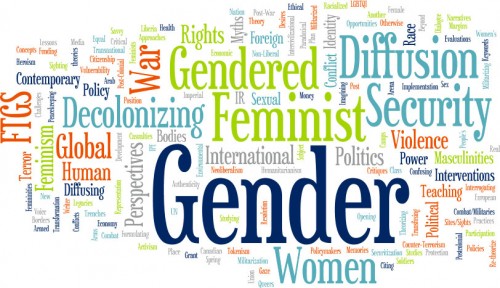
|
Why STEM Students Need Gender Studies
In an article for the American Association of University Professors, Carol Colatrella contends that gender studies scholarship and practice contribute to student development and to faculty networking.
Recent university budget reductions and debates about improving efficiencies in higher education have encouraged speculation about the relative values of different disciplines. Critics argue that the humanities and social sciences are less valuable than science, technology, engineering, and mathematics (STEM) fields, because they do not generate the same levels of external research funding, donations, and municipal investment. Those who attempt to assign value to particular fields weigh initial salaries for graduates, the availability of jobs, and the need for employees with scientific and technical knowledge and skills, deeming fields without clearly defined career paths less worthy of public support.
The headline of a January 29, 2013, article in the Chronicle of Higher Education, “N.C. Governor Wants to Tie University Support to Jobs, Not Liberal Arts,” illuminates the tension between employment goals and the liberal arts in public discourse about higher education. I was more immediately troubled, however, by Governor Pat McCrory’s assertion, in a radio conversation with former U.S. Secretary of Education William J. Bennett, that gender studies courses “have no chance of getting people jobs.”
As someone who has helped to build a gender studies program, I would offer a counterargument. Gender studies as a field illustrates the potential of interdisciplinary scholarship in today’s scientific and technical university: it can increase the representation of women and minorities in STEM fields and help prepare them to participate in those fields.
Politicians and the public should value the contributions of those who teach and carry out research in the interdisciplinary field of gender studies. The outcomes of effective gender studies programs and associated initiatives include increasing knowledge about social organization and cultural values; creating networks affiliating faculty, students, staff, and alumni; and enhancing campus community. The long-standing efforts to increase the numbers of women and historically underrepresented minorities in STEM fields at the Georgia Institute of Technology, where I teach, have gained traction from the success of academic and social initiatives connecting gender studies theory and practice in the liberal arts with other academic disciplines.
Infusing the concerns of gender studies in STEM fields can boost placement rates for women in high-salary science and technology jobs and lead to improved work-life balance across fields. My experiences at Georgia Tech demonstrate that gender studies scholarship and related activities are valuable in many ways.
Continue Reading
Carol Colatrella is professor in the School of Literature, Media, and Communication
|
Brown Sworn in as Member of DOE Electricity Advisory Committee
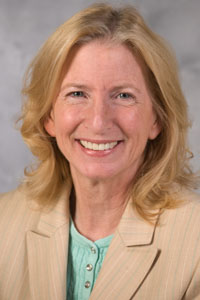
Marilyn Brown, professor in the School of Public Policy, remembers a time when people thought energy efficiency boosters were tree huggers who wanted to drink warm beer and take cold showers.
“Now the crowd is different. People who focus on saving energy and reducing demand on the grid wear suits and ties, work in research labs and set policy,” she said in an article in EnergyWire.
Brown was recently sworn in as a special government employee and member of the Department of Energy’s Electricity Advisory Committee, with a two-year term, the mission of which is to provide advice to the U.S. Department of Energy in implementing the Energy Policy Act of 2005, executing the Energy Independence and Security Act of 2007, and modernizing the nation's electricity delivery infrastructure.
The Southeast lags in policies that encourage energy efficiency, and most of the utilities are investor-owned and tightly regulated. Utility providers and policymakers will have to work out how to recoup revenues that are lost to energy efficiency. Brown, who is also on the board of the Tennessee Valley Authority, said, “Making the utilities whole is important [in the Southeast]. It's really a brave new world they are operating in.”
|
Fox Elected to American Sociological Association Council Section on Science, Knowledge, and Technology
Mary Frank Fox, ADVANCE Professor in the School of Public Policy, has been elected to the council of the Section on Science, Knowledge, and Technology of the American Sociological Association. The Section promotes scholarly research and professional activity on the sociology of science, knowledge, and technology, sponsoring meetings and conferences, newsletters, and publications.
Sections are officially-recognized groups of sociologists who share a common interest in a specific topic. There are 52 sections addressing topics ranging from aging to globalization.
Mary Frank Fox is an ADVANCE Professor in the School of Public Policy, and co-director of the Center for the Study of Women, Science, and Technology at Georgia Tech. Fox's research focuses on gender, science, and academia. Her research has introduced and established ways in which the participation and performance of women and men reflect and are affected by social and organizational features of science and academia.
|
Wood Named Georgia Author of the Year in Poetry
Robert E. Wood, associate professor in the School of Literature, Media, and Communication, has been named Georgia Author of the Year (GAYA) in Poetry by the Georgia Writers Association for The Awkward Poses of Others, a collection of poems influenced by other art forms, including film and painting.
The purpose of the GAYA award is to recognize Georgia writers for their contributions to the literary community. One winner and one finalist are selected in each of 13 categories to represent the finest qualities of the genre.
Wood has written two other books of poetry—Gorizia Notebook (2009) and Sleight of Hand (2012)—as well as a critical study, Some Necessary Questions of the Play: A Stage-Centered Analysis of Shakespeare's Hamlet (1994).
|
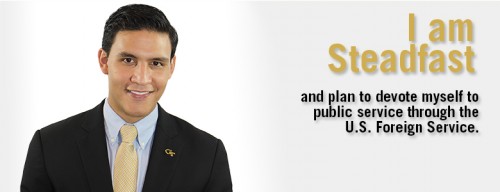
|
Pickering Fellowship Will Make Caballero's Foreign Service Dream a Reality
Camilo Caballero's dream has been a career with in U.S. Foreign Service. His dream is now set to become reality with his selection as a National Thomas R. Pickering Fellow by the U.S. Department of State and the National Woodrow Wilson Foundation.
A senior in the Ivan Allen College Sam Nunn School of International Affairs, Caballero was interviewed about his studies and his future.
Why did you choose the Ivan Allen College international affairs major?
International affairs allows me to bridge the gap between cultures. International affairs and politics have had a huge place in my heart since a very early age. The world is becoming smaller as domestic issues and policies affect other nations. International affairs is a major that covers overlapping issues from a macro perspective giving you the freedom to focus intensively on what you feel is important. Courses range from social to economic issues from the congress halls in Beijing to Wall Street and even deep into the Amazon jungles learning and analyzing issues that affect the everyday life of world citizens.
I chose Georgia Tech and the Ivan Allen College because I knew that it would offer a competitive environment and challenge me in every class. I also knew that it would provide an understanding of science and technology, which is highly important in today's increasingly technological world. I feel as though technology is the bridge between cultures. America must share its technology with third world countries as a catalyst to both economic and educational growth for those countries that are less fortunate.
¿Qué idiomas hablas?
The focus on modern language is also very important. I am originally from Colombia so I fluently speak both Spanish and English. I am currently studying Arabic and French as well. Not only will this give me an advantage in the job sector but it will also help me in all aspects of life. Language is the key to understanding other cultures. It is not just speaking and writing. It is knowing how to articulate what you mean in a correct cultural context.
What are some of your favorite or most interesting classes that you’ve taken and why specifically?
Latin American Politics-—investigating deep into Latin American politics, its history and heads of state. Looking at politics from various perspectives allowed me to understand Latin America today. Now when I watch trending media, I am able to come up with a logical conclusion about why issues occur and speculate about how those issues could affect the U.S.
My Dream Career Secured!
As a National Thomas R. Pickering Fellow, my professional career is set for the next eight years. After graduate school, I will be accepted automatically into the Foreign Service with the Department of State under a five-year contract. In addition to having my dream job secured, I receive full funding to attend graduate school at any university in the country, including Harvard, John Hopkins, Georgetown, Tufts, Princeton and Columbia –which are my top six schools.
Read the full profile.
|

|
Faculty and Staff Achievements Recognized at Spring College-Wide Meeting; Retiring Faculty
Dean Jacqueline Royster recognized retiring faculty and announced recipients of Ivan Allen College awards for faculty and staff during the spring State-of-the-College meeting.
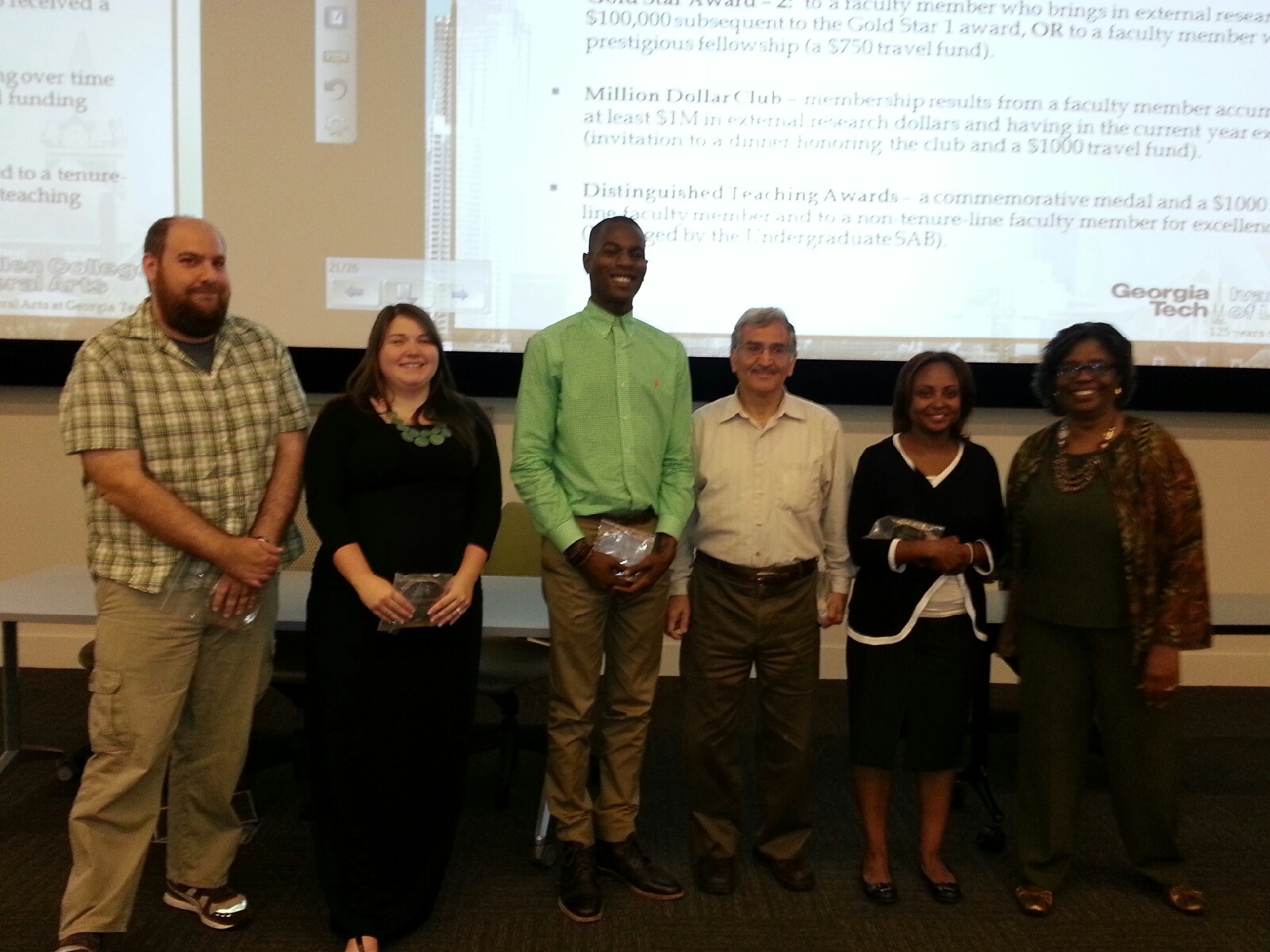
Staff "Buzz" Awards recognize and celebrate the extraordinary professional contributions and quality service of the Ivan Allen College of Liberal Arts staff members, and their role in advancing the mission and strategic goals of the College and the Georgia Institute of Technology. Recipients (pictured from left to right) are Vince Pedicino (INTA), Kelly Billings (ECON), Michael Terrell (LMC),
Sam Aral (IAC), and LaDonna Bowen (HTS) with Dean Jacqueline Royster.
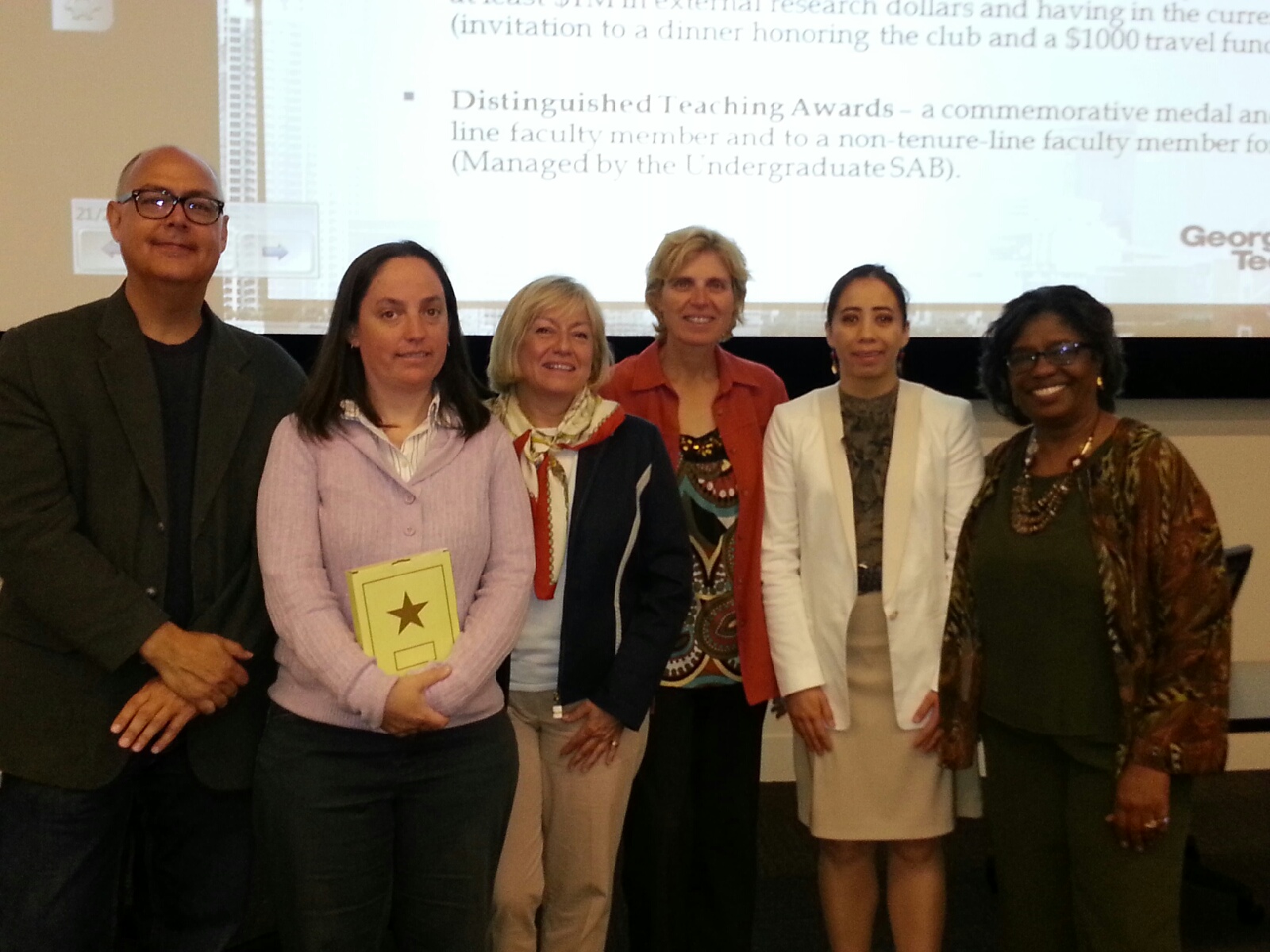
Gold Star Awards
Level 1 recognizes faculty who garner $100,000 or more in external research dollars for the first time with a $500 travel award.
Recipients were Anne Pollock (LMC) (2nd from left)
and Alexandra Mazalek (LMC, now at the University of Toronto) (not pictured).
Level 2 recognizes faculty who, subsequent to a Level 1 award, garner $100,000 in external research dollars OR receive presitgious fellowships with a $750 travel award. Recipients were Kirk Bowman (INTA) (left to right), Bettina Cothran (ModLangs), Katja Weber (INTA), Janelle Knox-Hayes (PubPol), Jacqueline Royster (LMC). Not pictured are recipients Justin Biddle (PubPol), Stephanie Jackson (INTA),
Hanchao Lu (HTS), and Brian Woodall (INTA).
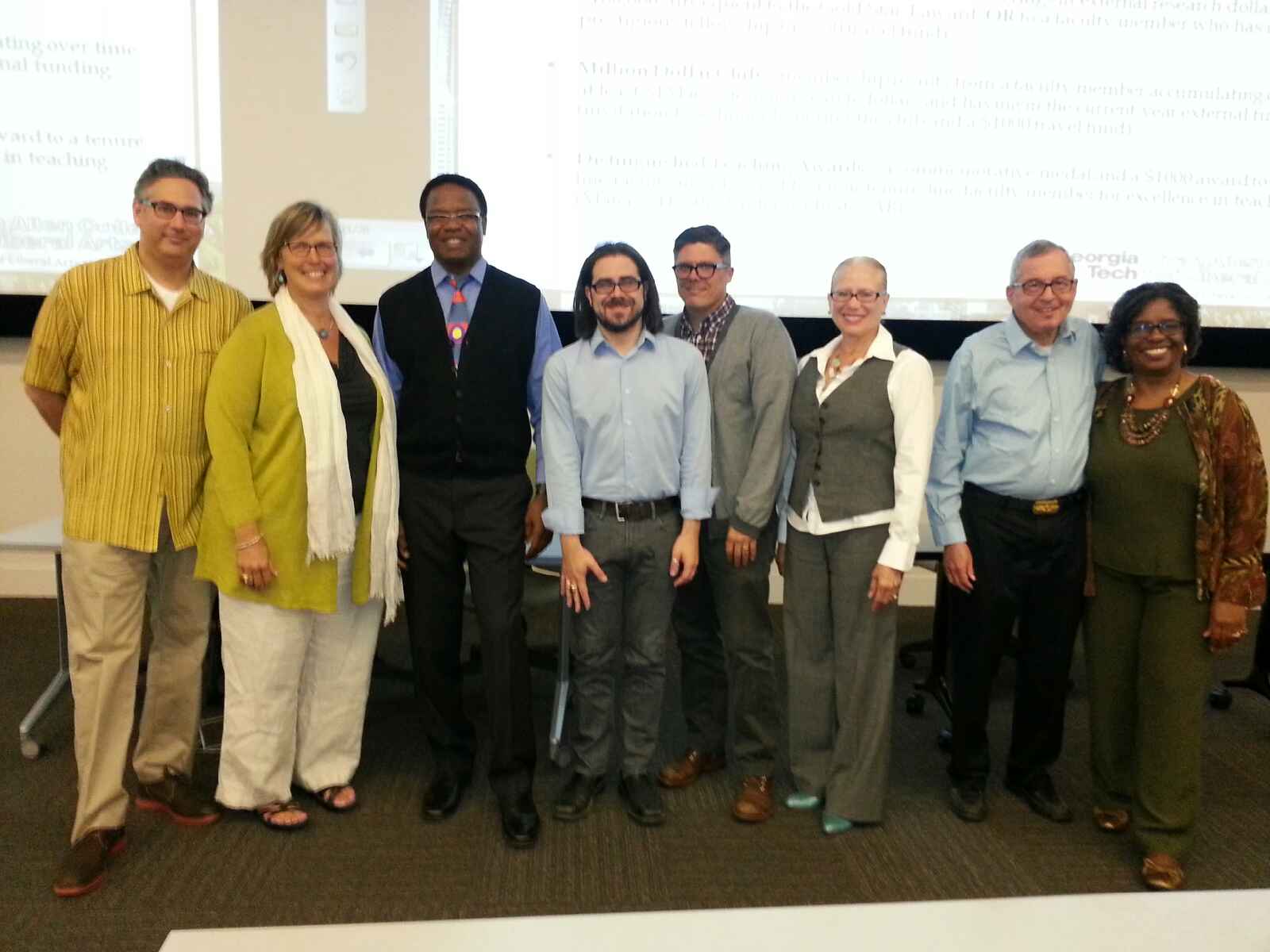
Million Dollar Club members are faculty who have accumulated over $1M in external research dollars and have external funding in the current year. The award include the Million Dollar Club dinner and a $1000 travel fund). Recipients were (l to r) Adam Stulberg (INTA), Julia Melkers (PubPol),
Danny Boston (INTA), Ian Bogost (LMC), Carl DiSalvo (LMC),
Helena Mitchell (PubPol), and Seymour Goodman (INTA).
Not pictured: Michael Best (INTA), Marilyn Brown (PubPol), Chris Le Dantec (LMC), Ute Fischer (LMC), Vicki Galloway (ModLangs), Brian Magerko (LMC),
and Philip Shapira (PubPol).
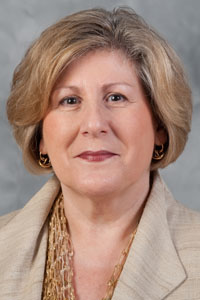 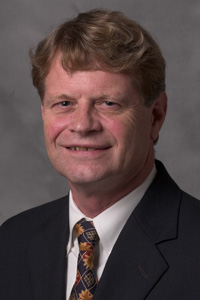
The college gave a warm farewell to two longtime faculty members
retiring from the School of Public Policy, Regent's Professor of cognitive
science, Nancy Nersessian, and Professor Emeritus Bryan Norton.
Colleagues share memories during a special reception in the Habersham courtyard.We are grateful for Nancy and Bryan's many years of friendship and teaching and we will them well in their future endeavors.
See our March issue for a story about retiring professor emeritus in Economics William Schaffer.
|
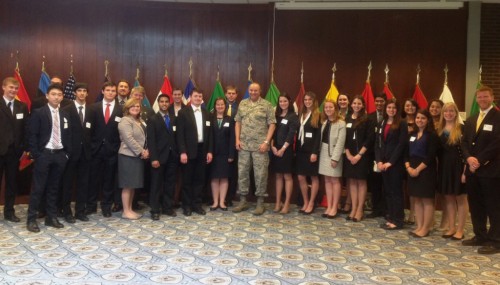
|
Students Meet with Supreme Allied Commander Breedlove
Students in the GT-EU study abroad program, directed by Vicki Birchfield, associate professor in The Sam Nunn School of International Affairs (INTA), had the opportunity to meet with General Philip Breedlove at Supreme Headquarters Allied Powers Europe (SHAPE) in Mons, Belgium.
Breedlove, Supreme Allied Commander Europe and a Georgia Tech alumnus (Civil Engineering 1977), and his senior officers welcomed the group to the Comprehensive Crisis and Operations Management Centre for a detailed briefing. The briefing focused NATO's system for assessing and managing threats within Europe, the North Atlantic, Mediterranean, North Africa, Middle East, and part of Asia.
At a reception following the briefing, General Breedlove mentioned how impressed he was with the students and the IAC international affairs program. Those attending the reception included Georgia Tech President G.P. "Bud" Peterson, Provost Raphael Bras, Executive Vice President for Research Steve Cross, Vice President for International Development Marta Garcia, Dean of Engineering Gary May, The Sam Nunn School of International Affairs Chair Joseph E. Bankoff, and School of Civil and Environmental Engineering Chair Reginald DesRoches.
|
Public Policy Alumna Dreschel Wins Law Writing Competition
Margaret Dreschel, née Burgess, alumna of the School of Public Policy and a current Berkeley Law student, received first place in the national Adam A. Milani Disability Law Writing Competition.
Sponsored by the Mercer University School of Law in honor of the late Adam Milani, the competition solicits student-written trial or appellate briefs on disability law, theory, or practice. Dreschel submitted a brief composed in a written and oral advocacy class. Her winning entry, selected from more than 70 submissions by law students from across the country, addressed a Title VII employment discrimination claim in which a department store worker was fired soon after disclosing his transgender identity to his supervisor.
Representing the plaintiff, Dreschel argued that the department store violated Title VII both by firing her client on the basis of transgender status and by relying on illegal sex stereotypes in its decision.
“Learning to write in this way has already been immensely helpful outside the classroom,” said Dreschel. “Last summer, I had to draft several motions to persuade the court one way or another.”
Dreschel graduate from the Ivan Allen College School of Public Policy in 2008. She susequently worked as a management consultant at McKinsey & Company, a finance and fundraising operator for a grassroots congressional campaign, and a policy analyst in the District of Columbia government. She hopes to become a federal government lawyer specializing in housing law, consumer protection, civil rights, or some combination thereof.
Article edited from Berkeley Law News.
|

|
Townsend Commissioned as Second Lieutenant in U.S. Marine Corps
Decades ago, serving in the Reserve Officers Training Corps (ROTC) was mandatory for all Georgia Tech students and the ranks of the campus battalion routinely numbered in the thousands. Today, Tech’s ROTC programs provide advanced training for only an elite few, such as School of Economics alumnus Andrew Townsend (pictured above, left).
“I always wanted to be a Marine, ever since I was young,” said Andrew Townsend just a couple of weeks before commencement and within days of achieving his childhood goal. He has been commissioned as a second lieutenant in the U.S. Marine Corps and in the months following will face The Basic School (TBS, a six-month program that the Marine Corps uses to invest in the education, training and further evaluation of its newly commissioned officers.
“I didn’t even think I’d go to Georgia Tech,” the Tucker native continued. “But I knew Tech was a good school and had the Naval ROTC. That’s what I wanted to do.”
The plan seems surprisingly simple for a student who has surpassed every benchmark laid out for him since he started in 2010. Townsend secured one of the coveted four-year national ROTC scholarships that would eventually train him to be a junior officer. During his tenure at Tech, Townsend also earned a slew of awards.
He was recognized as the Officer Candidates School Honor Graduate last summer; then he was named the Navy ROTC’s midshipman of the year by the United Services Automobile Association (USAA). Last fall, he served as battalion commander, helping train younger students preparing to attend Officer Candidates School. It’s the highest leadership a participant in the Marine Option Program can attain.
“If you want to be a true leader, you can’t worry about yourself. I look at Townsend and he gets through running a phenomenal run, almost Olympic athlete pace type-stuff,” Captain Joshua Roberts said. “And he gets done and he doesn’t go over and lick his own wounds, he doesn’t sit on the side of the field and stretch out. Immediately when he gets done, he looks around and goes back down the course to find more people to help them finish at a better time.”
Townsend is a bright representation of what Georgia Tech’s ROTC program looks like today. He is one of 18 students on track to commission as Marine Corps second lieutenants upon completion of their studies at Georgia Tech. Those 18 Marine options round out the 67 students participating in the Georgia Tech NROTC battalion, which includes students from Georgia State and Southern Polytechnic State. They make up just over half of the 124 students who are the Atlanta Region Consortium.
Read more about a day in the life of a Marine Corps Option.
|
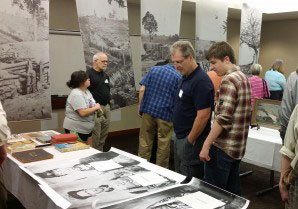
|
Technology and the American Civil War
The American Civil War brought more death, destruction, and hardship to Georgia and Georgians than all of America’s other wars combined. Black and white, rich and poor, men and women, old and young—almost everyone had a huge stake in its course and outcome. During this period Georgia became the industrial, transportation, and arsenal hub of the Confederacy. This spring, Georgia Tech hosted the first annual symposium Technology and the American Civil War to explore these themes at the intersection of history, technology, and liberal arts.
Georgia Tech entities—The Sam Nunn School of International Affairs; the School of History, Technology, and Society; the Ivan Allen College of Liberal Arts; and the Center for International Strategy, Technology, and Policy—teamed up with the Civil War Round Table of Atlanta and the Georgia Battlefields Association to host panels on topics ranging from medical technologies and treatments to field operations and communications. An exhibition of artifacts from the civil war era was presented in the Student Center’s Piedmont Room, adjacent to the theater in which the symposium was held.
The symposium on technology and the American Civil War comprised part of Georgia Tech's contribution to the war’s sesquicentennial commemoration. The program had over 150 attendees including students, faculty members, alumni, and community members. View the booklet passed out as part of the symposium here.
“Not only was this campus part of the Battle of Atlanta,” said Seymour Goodman, professor in The Sam Nunn School of International Affairs, “but Georgia as a whole became the arsenal and refuge of the Confederacy as it contracted.
The school that would become the Georgia Institute of Technology was founded less than 30 years after the picture below, a view from where the Habersham building and Ivan Allen College administrative offices currently stand, was taken.
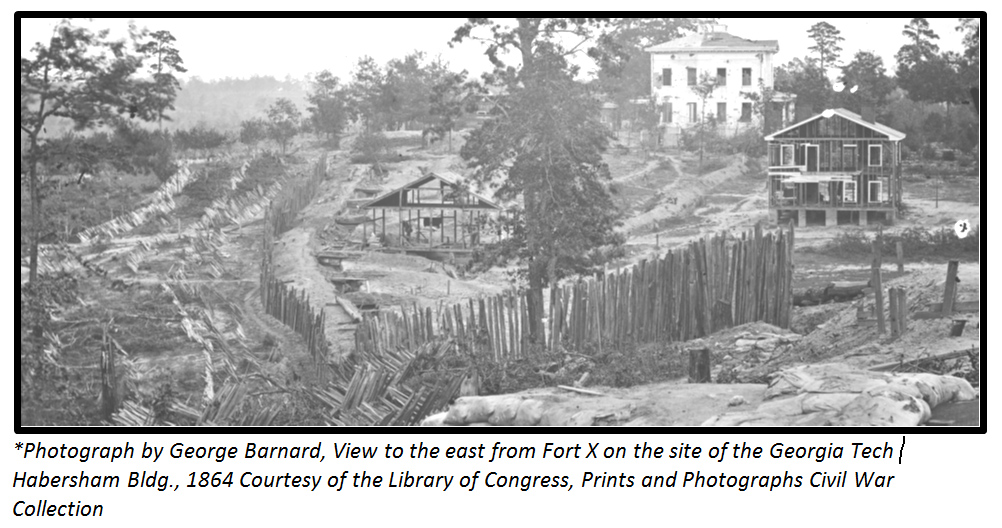
Nearly impenetrable fortifications prevented the grounds of the future site of Georgia Tech from becoming a real battlefield. The course of technological innovation was no less impacted by the war. As with any notable military engagement, the war spurred rapid technological change over an extremely short period of less than five years, so much so that it set the standard for later wars. Advances in photographic equipment and processes resulted in compelling imagery from the war.
Goodman and Ivan Allen College Dean Jacqueline Royster will be collaborating this fall to teach an honors class that aims to explore the experiences of various segments of the population throughout the Civil War. INTA 3803HP: Georgia During the Civil War Era will spur students to look at all categories of people—white, black, men, women, enslaved, free, affluent, poor— and understand what happened to them over the course of the war.
|
|













